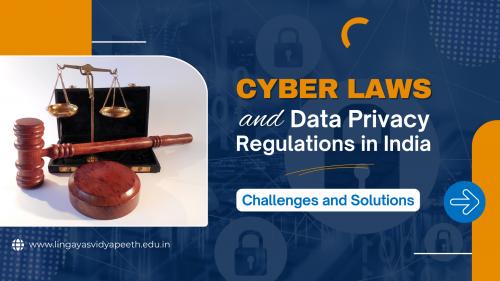Cyber Laws and Data Privacy Regulations in India: Challenges and Solutions


India, a land of vibrant traditions, is rapidly transforming into a digital powerhouse. As the internet weaves its way deeper into our lives, questions of security and privacy become paramount. This blog delves into the complexities of cyber laws and data privacy regulations in India, exploring the challenges and potential solutions in this ever-evolving landscape.
The Guardians of the Digital Realm: Laws and Regulations
India's legal framework for the digital world is anchored by the Information Technology Act (IT Act), 2000. This act, a pioneer in its time, established legal frameworks for e-commerce, digital signatures, and cybercrime. It empowers authorities to investigate cyber offenses, making activities like hacking and data breaches punishable.
However, the dynamic nature of technology has exposed limitations in the IT Act. The act, drafted before the social media boom, struggles to address contemporary concerns like data localization and the ever-increasing sophistication of cyber threats.
Recognizing this gap, the government introduced the Personal Data Protection Bill (PDP Bill), 2018. This landmark legislation, still under consideration, aims to empower individuals with control over their personal data. The bill proposes a robust framework for data collection, storage, and processing, outlining individual rights like data access and correction.
How Do Legal Systems at the Nexus of Law and Society?
Challenges: Navigating the Minefield
While India's cyber laws and proposed data privacy regulations represent a positive step, significant hurdles remain. Let's explore some key challenges:
- Evolving Threats: Cybercriminals are constantly innovating. Existing laws may not be agile enough to tackle new forms of cyberattacks like ransomware or deepfakes. (India Tackle Cyber Bullying? A Comprehensive Look at Legal Remedies)
- Balancing Security and Privacy: Striking a balance between national security concerns and individual privacy rights is a constant battle. Overly restrictive regulations can hinder innovation, while lax enforcement can leave citizens vulnerable.
- Lack of Awareness: Public awareness about cyber threats and data privacy rights is relatively low in India. This makes individuals more susceptible to phishing scams and hinders them from exercising their rights under proposed regulations.
- Data Localization: The PDP Bill mandates the storage of certain sensitive personal data within India. This raises concerns about cost implications for businesses and potential hurdles in cross-border data transfers.
- Enforcement Capacity: Effectively enforcing these laws requires a well-equipped and skilled workforce. Building robust law enforcement agencies capable of handling complex cyber investigations is crucial.
Solutions: Building a Secure Digital Future
Despite the challenges, there are potential solutions to navigate this intricate digital landscape:
- Continuous Upgradation: Regularly updating the IT Act and related regulations is essential to stay ahead of cyber threats. This necessitates collaboration between policymakers, legal experts, and cybersecurity professionals.
- Cybersecurity Education: Raising public awareness through educational campaigns can empower citizens to protect themselves online. This includes promoting safe online practices, identifying phishing attempts, and understanding data privacy rights.
- Collaboration is Key: Effective enforcement requires coordination between law enforcement agencies, cyber security experts, and various government bodies. Sharing information and expertise can lead to a more robust security framework.
- Focus on Awareness: Businesses must prioritize data security and user privacy. Transparency in data collection practices and clear communication with users are essential.
Conclusion:
In conclusion, cyber laws and data privacy regulations play a crucial role in safeguarding digital privacy and security in India's increasingly interconnected and data-driven society. As India continues its digital journey, ensuring a secure and privacy-conscious online environment is critical. This requires a collaborative effort from the government, industry leaders, and the public. By addressing the challenges, implementing effective solutions, and fostering a culture of cyber awareness, India can build a digital future that empowers its citizens and fosters innovation.
Choose Lingaya’s Vidyapeeth that is best colleges in Delhi NCR for LLB and LLM degree for its distinguished faculty, comprehensive curriculum, and vibrant legal community. With a focus on experiential learning, Lingaya’s Vidyapeeth offers opportunities for internships, moot court competitions, and legal clinics, providing practical skills and real-world experience. Our state-of-the-art facilities, extensive library resources, and renowned guest speakers enrich the learning experience and prepare students for successful careers in law.
Post Your Ad Here
Comments